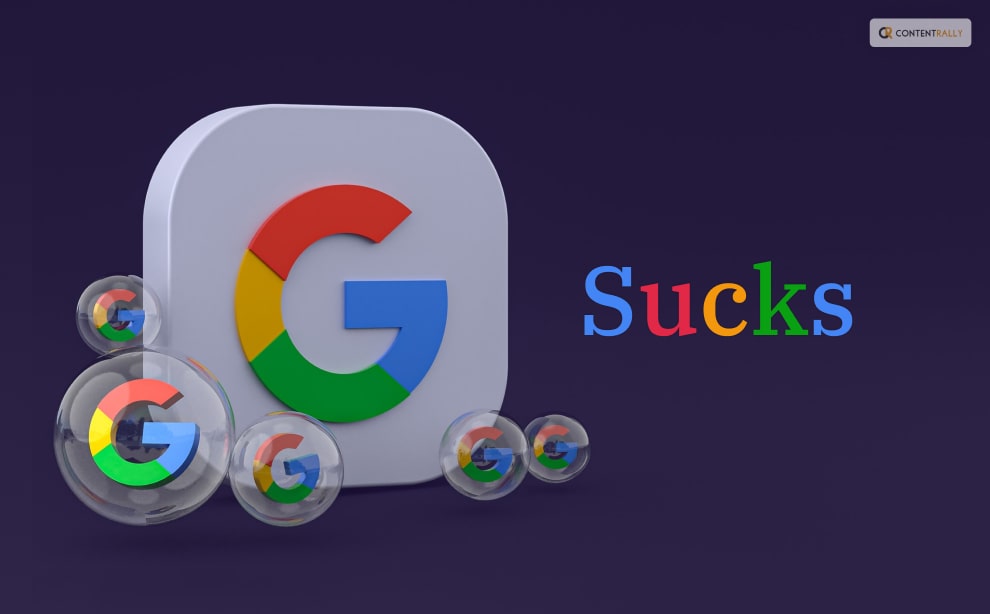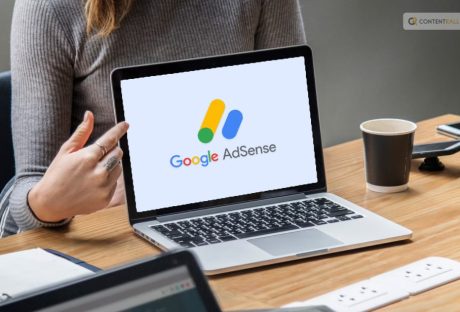If you are of the opinion that Google sucks really bad, then let me tell you something— you are not the only one who thinks like that!
Well, if I have to give my personal opinion or take a stand on this particular trend where I take a stand on why I think Google sucks or doesn’t and what is the reason behind my point, there is one thing that I would like to state at the very beginning. And that is the fact that I really LOVE using Google.
This is not only the largest and most used search engine in the world but also has a lot of products that people from across the world use o a daily basis. However, there can be times when you do not really prefer some of the things that happen in and around the billion-dollar company.
If you have been searching for the reasons why Google sucks, well, you have come to the end of your search. Keep reading this article till the end to learn more about the same…
Google Sucks! And Here’s Why!

It is impossible to imagine going about our daily lives without being able to “quickly Google” this or that because Google has become such a large part of our culture.
However, there are a few things that most people do not know about when it comes to Google. In this article, I will be talking about these few points which is why Google sucks!
So, if that is something that you have been searching for, you do not have to look any further. Here are the top five reasons why Google sucks:
1. It Stores And Steals Data
The fact that there is zero protection for consumers’ privacy is the primary reason I believe Google is bad. To put it another way, Google is terrible at ensuring the privacy of its users.
Almost all significant websites have experienced data breaches or privacy issues at some point. Google is also no different.
It’s tougher to avoid as hackers get more skilled and we divulge more of our personal information, but when a company as big as Google experiences one, it’s in a different league.
Over 500,000 individuals’ personal information was exposed due to an API issue on the now-defunct Google+, a serious breach of privacy.
It made it possible for third-party apps to access private information as well (third-party programs occasionally need permission to access a small bit of the data held by Google on a particular user in order to function).
This could contain extremely private information like your job title, nickname, birthdate, and email address—information that could be easily exploited to access financial information, personal documents, and other things.
2. Pretty Litigious
When you have the wealth and clout that Google possesses, it’s essentially game over for businesses and people that cross them.
Google has faced a variety of bizarre and interesting legal challenges over the years, including complaints from individuals whose privacy had been infringed by Google Maps photos, fraudulent personal information returned in searches, and inaccurate information that caused harm. Indeed, a class-action lawsuit over click fraud resulted in a $90 million settlement that Google was compelled to accept in 2006.
And how many instances of fabricated material, photographs protected by copyright, incorrect and damaging information, and erroneous advertising do you believe Google still engages in? Millions! That’s why I think Google is a somewhat litigious company, in my perspective.
3. Does Not Reward Its Content
The issue is that there will always be ways for dishonest people to use the rules of an organization that is solely governed by algorithms for their personal gain.
Without having extremely substantial financial resources, it is almost impossible to rank well for your content.
Many individuals mistakenly believe that search indexing is a fair process, yet nothing could be further from reality. Information on websites ending in.edu,.gov, and.org, as well as websites with links pointing to them, is given a higher.
A greater volume of information is also seen favorably, therefore websites that plagiarize from other sources but have a high publication rate can go up the results by virtue of posting three times per day.
Because there aren’t enough resources in this area, spam reports are frequently handled without being taken any further. Thus, political propaganda and copycat content are permitted to gain prominence.
4. Follows You Around
Many individuals now have Google-capable devices in their homes.
You might have an Android phone with built-in Google tools (including Chrome, Navigation, Play Services, Music, and more), a smart TV, a laptop that runs searches, or an Alexa-enabled speech assistant in your home.
Google will now constantly pursue you across the web with advertising content pertaining to those themes if it determines that you are interested in something.
Therefore, if you ever looked for something mildly embarrassing, it might still be lying around in your advertisement cookies, waiting to be brought up at a meeting at work or when the in-laws visit.
Additionally, Google has ingeniously buried the privacy policy settings for all of this data in places where most people wouldn’t think to delete them. However, doing so wouldn’t stop Google from keeping the information they already have about you.
5. Site Indexing Issues
I am aware that Google’s core business and origin was site searching, and some could claim that since they are currently ranked first, they are succeeding well. I concur in part. Here is my justification on why I think Google search indexing is bad.
I’ve heard that Google’s search indexing and ranking are “democratic” quite a bit. Simply said, that is untrue. Given that backlinks from.org,.gov, and.edu domains are more valuable than those from other domains and that they are frequently acquired through donations and sponsorship, this is only democratic in the sense of a large corporation. Today, it’s actually very tough to become very successful without finance and without advertising on the Internet.
Wrapping It Up!
In case you were searching for the answer to why is Google Sucks trending these days, I hope that this article has been of help to you. If there are any other queries related to the same, kindly feel free to let me know.
All that you need to do is scroll down till you reach the bottom of the page. Then leave your comments and queries in the box below. Do not forget to share your suggestions. And I will be there to answer them all for you!
More Resources:






















